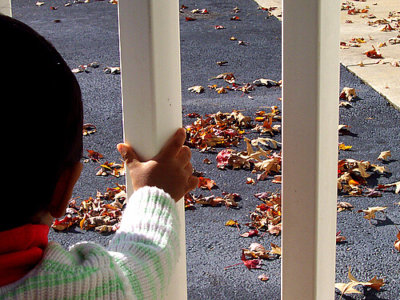Fear of Abandonment – 12 Signs it is Secretly Sabotaging Your Relationships

By: Nisha A
Andrea M. Darcy
Do you have trouble maintaining healthy relationships? It could be fear of abandonment at play, even if your childhood seemed stable.
Abandonment issues can rise from other forms of neglect or rejection besides a parent leaving. Perhaps you had a depressed or addicted parent who had no time for you, or lost a close family member like a grandparent to illness.
It can even be that your abandonment issues developed later in life, like your first attempt at romantic love ending in being terribly hurt.
[Read our piece on How Abandonment Issues Work for more].
12 Signs that fear of abandonment is affecting your relationships
What are the things you can look for that might mean your relationships are affected by a fear of abandonment?
1. You find letting someone get close harder than most.
If you have a fear of abandonment it often causes a deep fear of intimacy. Why? If someone fully knows you, they can fully reject you. Keeping others at arm’s length means you feel safer.
2. You might secretly doubt you’ve ever really been in love.
Those who fear abandonment rarely (if ever) show their full self to another. They can’t, because they have trained themselves to be self-protective or to manipulate others to love and stay with them. And it’s almost impossible for love to grow with the lack of authenticity these behaviours create.
3. You’ve been called controlling, clingy, or cold.

By: Kevin Jaako
An unconscious fear of being abandoned can mean you try to make sure this doesn’t happen again. And this tends to manifest as an extreme of holding on too tight, or not holding on at all. The latter means you can’t be left, as you don’t ever fully commit enough that someone can leave you.
4. You have a set of core beliefs that reflect abandonment.
Core beliefs are things we take as facts about the way the world works that are really just a perspective we have taken on. Core beliefs those with a fear of abandonment have tend to be along the lines of –
- I can’t trust anyone
- I am not loveable as is
- I don’t really deserve to be loved
- I have to work hard and earn love
- why love anyone when they just leave anyway
- I don’t really need anyone
- the world is a dangerous place.
5. You feel lonely even when you are in a relationship.
Fear of abandonment leads to counterdependency – an inner belief you don’t really need anyone and it’s not a good idea to depend on someone to be there for you. And counterdependency leads to loneliness, taking you further and further away from the truth that as humans we do indeed need each other, even as we also need to be able to trust ourselves.
6. You tend to pick partners who abandon you in some way.

By: vishwaant avk
Some people who experience abandonment as a child develop a core belief that they deserve to be abandoned. This means as an adult they re-enact the experience of abandonment in their relationships.
This does not have to mean that all your partners break up with you, although it can. Other ways we can be abandoned include partners who are emotionally unavailable or addicted to something. A workaholic, for example, addicted to being busy, will leave you feeling abandoned. As will someone who is not over another previous love and can’t provide you with real love and attention.
7. Or, you always leave first, and your emotions can turn off like there is a switch inside you.
Those with abandonment issues are often the partners who run at the first slight, rejecting before being rejected.
If you don’t physically abandon the relationship, you might emotionally abandon it as soon as something hurts you, or always reach a point in relationships where you suddenly go ‘numb’.
It might feel that there is a switch that goes off and from that point forward you can’t bring yourself to care about the other person any more.
From being very in love, you then go to feeling nothing. This is actually a deep-rooted self protection mechanism designed to avoid hurt.
8. You are extremely oversensitive and reactive with partners.
It might even feel that you lack the emotional ‘skin’ others seem to have, so that everything hurts you.
If you are very sensitive and reactive, leading to a strong pattern of pushing and pulling partners, look into the symptoms of borderline personality disorder. Fear of abandonment is one of its leading symptoms.
9. You don’t have good boundaries with romantic partners.
Fear of abandonment can mean you overcompensate in relationships. You might be codependent, constantly trying to please the other. Or you might simply lack personal boundaries, going along with what the other wants and not deciding what works and doesn’t work for you personally.
10. You blame yourself, secretly, for the relationship not working.

By: Janice Magracia
Abandonment and neglect as a child can leave the child to internalise the experience, believing it to somehow be their fault. This gives rise to low self-esteem and shame.
Even if you act tough in relationships, or outwardly blame the other, deep down there is likely a feeling that you are flawed and at fault.
11. You never feel you fit in with the friends and families of your partners.
Deciding you don’t fit in with others is a way to keep them at arm’s length, so that if one day you are not part of their life it hurts less. And if you have abandonment issues, your unconscious thinks far ahead to such times, assuming all people actually leave.
12. You have low grade anxiety, depression, or fatigue when you are in relationships.
Feeling left behind or overlooked by the very adults you depend on for survival is truly a scary thing for a child. The more you try to love someone as an adult, the more that primal fear you once felt can be triggered if you have not worked to heal it. This can manifest as sudden low moods, anxiety, overwhelming fatigue, and problems sleeping, including interrupted sleep or nightmares.
Is fear of abandonment really such a big deal?
Fear of abandonment can lead to severe loneliness and both anxiety and depression disorders. And fear of abandonment is a common symptom of borderline personality disorder, which can leave you feeling so overwhelmed by life you resort to self-harm to manage.
It takes a real commitment to being honest about your feelings and past to move beyond a fear of abandonment. It’s recommended to seek the help of a counsellor or psychotherapist who can provide a safe and supportive space for such exploration. He or she can encourage you to try new ways of relating to others that don’t reenact old patterns but instead move you towards the real intimacy and connection you desire.
Would you like help with your fear of abandonment? Harley Therapy offers expert counsellors and psychotherapists in London, UK, as well as worldwide via online therapy.
Question we didn’t answer? Post below.
 Andrea M. Darcy is a health writer and a mento who loves writing about relationships. Find her on Instagram @am_darcy
Andrea M. Darcy is a health writer and a mento who loves writing about relationships. Find her on Instagram @am_darcy




